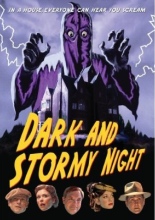
 Charles Ludlam, late founder of the Ridiculous Theatrical Company, once wrote a play the dialogue of which consisted of the punch lines of old jokes. No, I don’t remember the title. Jeez, do I have to do everything around here?
Charles Ludlam, late founder of the Ridiculous Theatrical Company, once wrote a play the dialogue of which consisted of the punch lines of old jokes. No, I don’t remember the title. Jeez, do I have to do everything around here?
Larry Blamire, creator of one of this century’s great cult classic films, The Lost Skeleton of Cadavra, pulls off something just as challenging and funny with Dark and Stormy Night, in which everything is a dark-old-house spook-movie cliché: plot, characters, props, setting — everything. The dialogue is a thing of beauty, comprised almost entirely of stream-of-unconsciousness non sequiturs. One character asks the butler to provide sherry for the guests, and “Bring me an iced tea sandwich.”
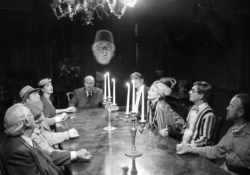 The relatives — and assorted strangers, servants and one guy in a gorilla suit — have gathered for the reading of the will, then they start dropping like lead bon mots. Blamire’s usual gang of thesps, with a quartet of guest actors who have been in movies you’ve actually heard of, deliver their senseless lines as if any of this had any meaning beyond tickling your nostalgia for Hollywood Poverty Row thrillers until it hollers, “Uncle!”
The relatives — and assorted strangers, servants and one guy in a gorilla suit — have gathered for the reading of the will, then they start dropping like lead bon mots. Blamire’s usual gang of thesps, with a quartet of guest actors who have been in movies you’ve actually heard of, deliver their senseless lines as if any of this had any meaning beyond tickling your nostalgia for Hollywood Poverty Row thrillers until it hollers, “Uncle!”
Blamire’s talent for absurdist burlesque is immense and I’d like to see it rewarded with mainstream recognition, but if that meant he’d have to stop making these low-budget masterpieces, well, screw that. A wider multiplex audience could never love him like we do. —Doug Bentin

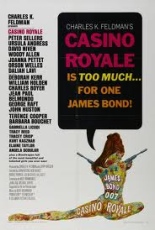
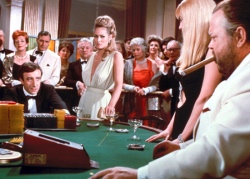 Hating each other, Welles and Sellers refused to be on set at the same time, so their scenes had to be shot separately and then welded together. It must have been pure hell. The enmity, at its core, seems to have been the result of people fawning over Welles and ignoring Sellers, who was finally fired before filming completed. He was replaced by a cardboard cutout.
Hating each other, Welles and Sellers refused to be on set at the same time, so their scenes had to be shot separately and then welded together. It must have been pure hell. The enmity, at its core, seems to have been the result of people fawning over Welles and ignoring Sellers, who was finally fired before filming completed. He was replaced by a cardboard cutout.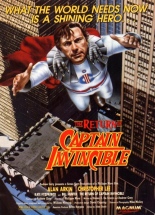
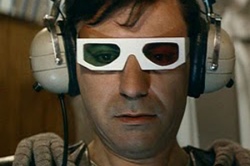 Beyond a lazy script, lackluster direction and horrible songwriting, the movie’s biggest flaw is the casting of Kate Fitzpatrick as the female detective who lures Invincible out of retirement. Not only is she a terrible actress, but she also has all of the sex appeal of a
Beyond a lazy script, lackluster direction and horrible songwriting, the movie’s biggest flaw is the casting of Kate Fitzpatrick as the female detective who lures Invincible out of retirement. Not only is she a terrible actress, but she also has all of the sex appeal of a 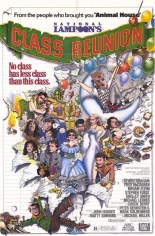
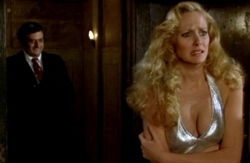 The main difference between them is that Class Reunion was marketed as a straight comedy, which it constantly (and depressingly) attempts to be, while Slaughter High was marketed as a straight horror film, despite the fact that a combination of the filmmaker’s incompetence and contempt for the audience makes it play far more like an unsuccessful spoof than a typical slasher movie.
The main difference between them is that Class Reunion was marketed as a straight comedy, which it constantly (and depressingly) attempts to be, while Slaughter High was marketed as a straight horror film, despite the fact that a combination of the filmmaker’s incompetence and contempt for the audience makes it play far more like an unsuccessful spoof than a typical slasher movie. Yes, Yankee Doodle in Berlin is silent, but don’t go away. Let me tell you about it. It’s different. Really.
Yes, Yankee Doodle in Berlin is silent, but don’t go away. Let me tell you about it. It’s different. Really.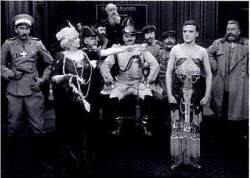 The comedy comes from shameless slapstick and the conceit that the Kaiser is nothing but a henpecked husband who is constantly under the thumb of his frau (Eva Thatcher). Add that to the propagandistic notion that Germany was being ruled by numbnuts and idiots (played by silent comedy stalwarts Ben Turpin, Chester Conklin, Bert Roach and others) and you have a fast-paced 58 minutes of funhouse slapstick that makes Mel Brooks look like Alan Rickman.
The comedy comes from shameless slapstick and the conceit that the Kaiser is nothing but a henpecked husband who is constantly under the thumb of his frau (Eva Thatcher). Add that to the propagandistic notion that Germany was being ruled by numbnuts and idiots (played by silent comedy stalwarts Ben Turpin, Chester Conklin, Bert Roach and others) and you have a fast-paced 58 minutes of funhouse slapstick that makes Mel Brooks look like Alan Rickman.